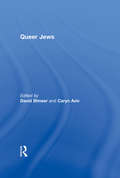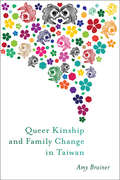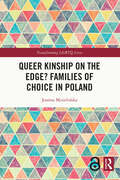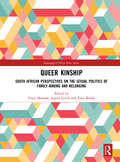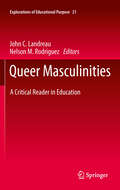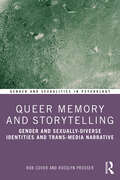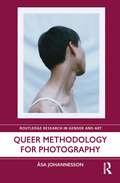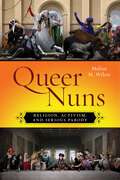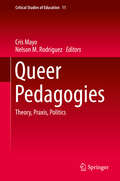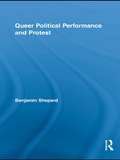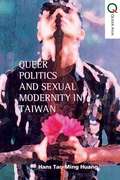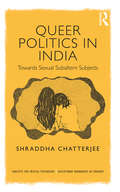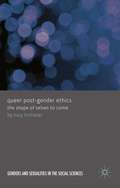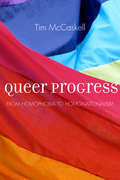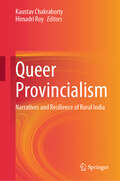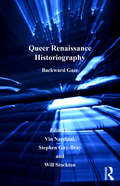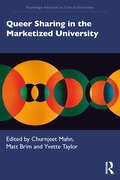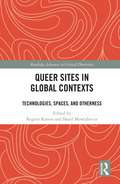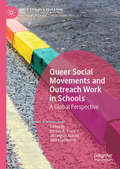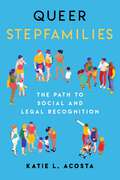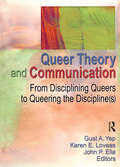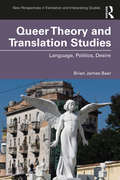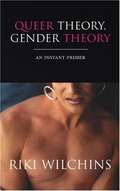- Table View
- List View
Queer Jews
by David Shneer Caryn AvivQueer Jews describes how queer Jews are changing Jewish American culture, creating communities and making room for themselves, as openly, unapologetically queer and Jewish. Combining political analysis and personal memoir, these essays explore the various ways queer Jews are creating new forms of Jewish communities and institutions, and demanding that Jewish communities become more inclusive.
Queer Kids and Social Violence: The Limits of Bullying
by Melissa J. Smith Elizabethe PayneChallenging the myths about LGBTQ+ kids and bullying: what it means to protect queer kids in schools Conversations around LGBTQ+ kids in school have become dominated by the subject of bullying. Although this may be due to good-faith efforts to protect vulnerable students, Queer Kids and Social Violence demonstrates that a focus on bullying as acts of individual peer aggression fails to address the social norms that perpetuate the violence. Considering the broader contexts of bullying, this volume offers ways to engage with queer youth that are both more humanizing and more likely to create sustainable change. Essays by leading international scholars analyze how bullying discourse shapes policy and practice, using in-depth case studies, research findings, and examinations of political policy to guide readers through the various forms of violence, identity regulation, and identity erasure in schools. Offering conversation-shifting interventions to respond to a difficult and frightening political moment for LGBTQ+ youth, Queer Kids and Social Violence is a rounded, empathetic picture that does queer youth justice and points the way toward safer schools for all. Contributors: Ana María Amigo-Ventureira, Durell M. Callier, Cristyn Davies, Renée DePalma, Tania Ferfolja, Jessica Fields, Elliot Fonarev, Jen Gilbert, Tristan Gleason, Dominique C. Hill, Angela Ingram, Laurie Gutmann Kahn, Cris Mayo, Mollie McQuillan, Aoife Neary, C.J. Pascoe, Victoria Rawlings, EJ Renold, Jessica Ringrose, Kerry H. Robinson, Dorte Marie Søndergaard, Cris Townley, Jacqueline Ullman, Boni Wozolek. Retail e-book files for this title are screen-reader friendly with images accompanied by short alt text and/or extended descriptions.
Queer Kinship and Family Change in Taiwan (Families in Focus)
by Amy BrainerInterweaving the narratives of multiple family members, including parents and siblings of her queer and trans informants, Amy Brainer analyzes the strategies that families use to navigate their internal differences. In Queer Kinship and Family Change in Taiwan, Brainer looks across generational cohorts for clues about how larger social, cultural, and political shifts have materialized in people’s everyday lives. Her findings bring light to new parenting and family discourses and enduring inequalities that shape the experiences of queer and heterosexual kin alike. Brainer’s research takes her from political marches and support group meetings to family dinner tables in cities and small towns across Taiwan. She speaks with parents and siblings who vary in whether and to what extent they have made peace with having a queer or transgender family member, and queer and trans people who vary in what they hope for and expect from their families of origin. Across these diverse life stories, Brainer uses a feminist materialist framework to illuminate struggles for personal and sexual autonomy in the intimate context of family and home.
Queer Kinship on the Edge? Families of Choice in Poland (Transforming LGBTQ Lives)
by Joanna MizielińskaQueer Kinship on the Edge? Families of Choice in Poland explores ways in which queer families from Central and Eastern Europe complicate the mainstream picture of queer kinship and families researched in the Anglo-American contexts. The book presents findings from under-represented localities as a starting point to query some of the expectations about queer kinship and to provide insights on the scale and nature of queer kinship in diverse geopolitical locations and the complexities of lived experiences of queer families. Drawing on a rich qualitative multi-method study to address the gap in queer kinship studies which tend to exclude Polish or wider Central and Eastern perspectives, it offers a multi-dimensional picture of ‘families of choice’ improving sensitivity towards differences in queer kinship studies. Through case studies and interviews with diverse members of queer families (i.e., queer parents, their children) and their families of origin (parents and siblings), the book looks at queer domesticity, practices of care, defining and displaying families, queer parenthood familial homophobia, and interpersonal relationships through the life course. This study is suitable for those interested in LGBT studies, sexuality studies, kinship and Eastern European studies.
Queer Kinship: South African Perspectives on the Sexual politics of Family-making and Belonging (Routledge/UNISA Press Series)
by Vasu Reddy Racy Morison Ingrid LynchWhat makes kinship queer? This collection from leading and emerging thinkers in gender and sexualities interrogates the politics of belonging, shining a light on the outcasts, rebels, and pioneers. Queer Kinship brings together an array of thought-provoking perspectives on what it means to love and be loved, to ‘do family’ and to belong in the South African context. The collection includes a number of different topic areas, disciplinary approaches, and theoretical lenses on familial relations, reproduction, and citizenship. The text amplifies the voices of those who are bending, breaking, and remaking the rules of being and belonging. Photo-essays and artworks offer moving glimpses into the new life worlds being created in and among the ‘normal’ and the mundane. Taken as a whole, this text offers a critical and intersectional perspective that addresses some important gaps in the scholarship on kinship and families. Queer Kinship makes an innovative contribution to international studies in kinship, gender, and sexualities. It will be a valuable resource to scholars, students, and activists working in these areas.
Queer Masculinities: A Critical Reader in Education
by Nelson Rodriguez John LandreauQueer Masculinities: A Critical Reader in Education is a substantial addition to the discussion of queer masculinities, of the interplay between queer masculinities and education, and to the political gender discourse as a whole. Enriching the discourse of masculinity politics, the cross-section of scholarly interrogations of the complexities and contradictions of queer masculinities in education demonstrates that any serious study of masculinity--hegemonic or otherwise--must consider the theoretical and political contributions that the concept of queer masculinity makes to a more comprehensive and nuanced understanding of masculinity itself. The essays adopt a range of approaches from empirical studies to reflective theorizing, and address themselves to three separate educational realms: the K-12 level, the collegiate level, and the level in popular culture, which could be called 'cultural pedagogy'. The wealth of detailed analysis includes, for example, the notion that normative expectations and projections on the part of teachers and administrators unnecessarily reinforce the values and behaviors of heteronormative masculinity, creating an institutionalized loop that disciplines masculinity. At the same time, and for this very reason, schools represent an opportunity to 'provide a setting where a broader menu can be introduced and gender/sexual meanings, expressions, and experiences boys encounter can create new possibilities of what it can mean to be male'. At the collegiate level chapters include analysis of what the authors call 'homosexualization of heterosexual men' on the university dance floor, while the chapters of the third section, on popular culture, include a fascinating analysis of the construction of queer 'counternarratives' that can be constructed watching TV shows of apparently hegemonic bent. In all, this volume's breadth and detail make it a landmark publication in the study of queer masculinities, and thus in critical masculinity studies as a whole.
Queer Memory and Storytelling: Gender and Sexually-Diverse Identities and Trans-Media Narrative (Gender and Sexualities in Psychology)
by Rob Cover Rosslyn ProsserQueer Memory and Storytelling unpacks the ways in which the narrative practices of recounting past experiences play a formative role in formation of identities, cultures, and social change among gender and sexually diverse individuals. Grounded in theoretical research, this work delves into historical accounts, case studies, and draws from the rich tapestry of interviews conducted during extensive LGBTQ+ research studies. It explores the power of memorial storytelling to shape the narratives surrounding gender and sexual diversity, offering profound insights into the role storytelling plays as a deeply subjective, personal, communal, and cultural form of expression. The book introduces a queer perspective that reframes the study of narrative psychology, community history, philosophies of subjectivity and the socio-cultural heritage of LGBTQ+ minority communities. It also focuses on the pivotal role played by memory and reflection found within online coming-up stories and contemporary modes of shared community memorialization. By employing queer theory, ethnographic research, interviews and meticulous media/textual analysis, the book presents new frameworks for comprehending the myriad facets of identity, and investigating what it means to remember and narrate selfhood in the context of social life, actively ‘queering’ the concept of memory. Queer Memory and Storytelling will appeal to academics, researchers and students in psychology, sociology, gender and sexuality studies, and communication.
Queer Memory and Storytelling: Gender and Sexually-Diverse Identities and Trans-Media Narrative (Gender and Sexualities in Psychology)
by Rob Cover Rosslyn ProsserQueer Memory and Storytelling unpacks the ways in which the narrative practices of recounting past experiences play a formative role in formation of identities, cultures, and social change among gender and sexually diverse individuals.Grounded in theoretical research, this work delves into historical accounts, case studies, and draws from the rich tapestry of interviews conducted during extensive LGBTQ+ research studies. It explores the power of memorial storytelling to shape the narratives surrounding gender and sexual diversity, offering profound insights into the role storytelling plays as a deeply subjective, personal, communal, and cultural form of expression. The book introduces a queer perspective that reframes the study of narrative psychology, community history, philosophies of subjectivity and the socio-cultural heritage of LGBTQ+ minority communities. It also focuses on the pivotal role played by memory and reflection found within online coming-up stories and contemporary modes of shared community memorialization. By employing queer theory, ethnographic research, interviews and meticulous media/textual analysis, the book presents new frameworks for comprehending the myriad facets of identity, and investigating what it means to remember and narrate selfhood in the context of social life, actively ‘queering’ the concept of memory.Queer Memory and Storytelling will appeal to academics, researchers and students in psychology, sociology, gender and sexuality studies, and communication.
Queer Methodology for Photography (Routledge Research in Gender and Art)
by Asa JohannessonThis book presents new ways of approaching photographic discourse from a queer perspective, offering discussions on what a queering methodology for photography may entail by drawing links between artistic strategies in photographic practice and key theoretical concepts from photography theory, queer theory, critical theory, and philosophy. With different examples of conceptual perspectives, including representation, formalism, and mediumlessness, it seeks to diversify queer methodology for photography. While primarily addressing photography, this book is entwined with broader philosophical questions concerning identity, difference, and the creations of systems of thought that limit the possibilities of existence to binary categorisation. It proposes a new concept of the photographic image that addresses its materiality, in the form of the poetic and the political, in relationship to a generative principle that is named as a queer quality: the photograph’s ability to voice queer concerns also beyond its role as representation. This book will be of interest to scholars working in photography, art history, queer studies, new materialism, and posthumanism.
Queer Nuns: Religion, Activism, and Serious Parody (Sexual Cultures #33)
by Melissa M. WilcoxAn engaging look into the Sisters of Perpetual Indulgence, queer activists devoted to social justice The Sisters of Perpetual Indulgence make up an unlikely order of nuns. Self-described as “twenty-first century queer nuns,” the Sisters began in 1979 when three bored gay men donned retired Roman Catholic nuns’ habits and went for a stroll through San Francisco’s gay Castro district. The stunned and delighted responses they received prompted these already-seasoned activists to consider whether the habits might have some use in social justice work, and within a year they had constituted the new order. Today, with more than 83 houses on four different continents, the Sisters offer health outreach, support, and, at times, protest on behalf of queer communities. In Queer Nuns, Melissa M. Wilcox offers new insights into the role the Sisters play across queer culture and the religious landscape. The Sisters both spoof nuns and argue quite seriously that they are nuns, adopting an innovative approach the author refers to as serious parody. Like any performance, serious parody can either challenge or reinforce existing power dynamics, and it often accomplishes both simultaneously. The book demonstrates that, through the use of this strategy, the Sisters are able to offer an effective, flexible, and noteworthy approach to community-based activism. Serious parody ultimately has broader applications beyond its use by the Sisters. Wilcox argues that serious parody offers potential uses and challenges in the efforts of activist groups to work within communities that are opposed and oppressed by culturally significant traditions and organizations – as is the case with queer communities and the Roman Catholic Church. This book opens the door to a new world of religion and social activism, one which could be adapted to a range of political movements, individual inclinations, and community settings.
Queer Pedagogies: Theory, Praxis, Politics (Critical Studies of Education #11)
by Nelson M. Rodriguez Cris MayoThis book invites readers to explore the critical interruptions occasioned by queer pedagogies. Building on earlier scholarly work in this area, as well as pedagogical production arising out of queer activism, the chapters in this volume examine a broad range of themes as they collectively grapple with the meaning and practice of queer pedagogy across different contexts. In this way, Queer Pedagogies provides a glance at new ways of thinking about and acting on contemporary educational topics and debates situated at the intersection of queer studies and education. In taking up the concept of queer pedagogy, the volume provides ample opportunities for scholars, educators, activists, and other cultural workers to critically engage with ongoing questions of theory, praxis, and politics.
Queer Political Performance and Protest (Routledge Advances in Sociology)
by Benjamin ShepardFrom the birth of the Gay Liberation through the rise of the AIDS Coalition to Unleash Power (ACT UP) in 1987, the global justice movement in 1994, the largest day of antiwar protest in world history in February 2003, the Republican National Convention protests in August 2004, and the massive immigrant rights rallies in the spring of 2006, the streets of cities around the world have been filled with a new theatrical model of protest. Elements of fun, creativity, pleasure, and play are cornerstones of this new approach toward protest and community building. No movement has had a larger influence on the emergence of play in social movement activity than the gay liberation and queer activism of the past thirty years. This book examines the role of play in gay liberation and queer activism, and the ways in which queer notions of play have influenced a broad range of social movements.
Queer Politics and Sexual Modernity in Taiwan
by Hans Tao-Ming HuangThis book analyses the critical reception of Pai Hsien-yung's Crystal Boys, one of Taiwan's first recognized gay novels and one which has played an important role in redefining sexual modernity and linking this to ongoing cultural dialogues on state-building. It examines the deployment of sexuality over the past five decades in Taiwan by paying particular attention to male homosexuality and prostitution. In addition to literary and film material, the study engages a number of relevant legal cases and media reports. Through Hans Huang's primary research and historical investigations, the book not only illuminates the construction of gendered sexual identities in Taiwanese culture but also, in a reflexive fashion, critiques the culture that produces them. Hans Tao-Ming Huangis assistant professor in the English Department, National Central University, Taiwan.
Queer Politics in India: Towards Sexual Subaltern Subjects (Concepts for Critical Psychology)
by Shraddha ChatterjeeQueer Politics in India simultaneously tells two interconnected stories. The first explores the struggle against violence and marginalization by queer people in the Indian subcontinent, and places this movement towards equality and inclusion in relation to queer movements across the world. The second story, about a lesbian suicide in a small village in India, interrupts the first one, and together, these two stories push and pull the book to elucidate the failure and promise of queer politics, in India and the rest of the world. This book emerges at a critical time for queer politics and activism in India, exploring the contemporary queer subject through the different lenses of critical psychology, Lacanian psychoanalysis, feminist and queer theory, and cultural studies in its critique of the constructions of discourses of ‘normal’ sexuality. It also examines how power determines further segregations of ‘abnormal’ sexuality into legitimate and illegitimate queer subjectivities and authentic and inauthentic queer experiences. By allowing a multifaceted and engaged critique to emerge that demonstrates how the idea of a universal queer subject fails lower class, lower caste queer subjects, and queer people of colour, the author expertly highlights how all queer people are not the same, even within queer movements, as the book asks the questions, "which queer subject does queer politics fight for?", and, "what is the imagination of a queer subject in queer politics?" This hugely important and timely work is relevant across many disciplines, and will be useful for students of psychology and other academic areas, as well as researchers and activist organizations.
Queer Post-Gender Ethics: The Shape of Selves to Come (Genders and Sexualities in the Social Sciences)
by Lucy NicholasCan society operate without gender and even biological sex classifications? Queer Post-Gender Ethics argues that we could exist, formulate our relationships and be sexual in more androgynous ways. Outlining a political vision for how a post-gender sociality might be achieved, it presents queer social practices for a truly gender neutral world.
Queer Progress: From Homophobia to Homonationalism
by Tim McCaskellHow did a social movement evolve from a small group of young radicals to the incorporation of LGBTQ communities into full citizenship on the model of Canadian multiculturalism? Tim McCaskell contextualizes his work in gay, queer, and AIDS activism in Toronto from 1974 to 2014 within the shift from the Keynesian welfare state of the 1970s to the neoliberal economy of the new millennium. A shift that saw sexuality —once tightly regulated by conservative institutions—become an economic driver of late capitalism, and sexual minorities celebrated as a niche market. But even as it promoted legal equality, this shift increased disparity and social inequality. Today, the glue of sexual identity strains to hold together a community ever more fractured along lines of class, race, ethnicity, and gender; the celebration of LGBTQ inclusion pinkwashes injustice at home and abroad. Queer Progress tries to make sense of this transformation by narrating the complexities and contradictions of forty years of queer politics in Canada’s largest city.
Queer Provincialism: Narratives and Resilience of Rural India
by Kaustav Chakraborty Himadri RoyThis book focuses on the plight of the queer people in rural India. By examining how rural life shapes queer identities, the book offers a fresh perspective that bridges the gap between urban and rural queer communities. While on one hand, it elucidates the various ways in which people living in the Indian villages deal with the queer subjects and subjectivities, on the other hand, it explores the ways in which the process of growing up in the countryside makes its impact on its village queers. Drawing from personal experiences, ethnographic research, and cultural representations, this multidisciplinary book explores the intersection of gender, sexuality, and rural landscapes. It delves into the historical and cultural forces that influence the lives of lesbian, gay, bisexual, asexual, and transgender individuals in provincial India. The collaborative effort by activists and scholars across fields such as literary studies, gender studies, political science, and more provides a rich analysis of the rural queer experience. It challenges the urban-centric narrative and contributes significantly to gender and sexuality studies, sociology, cultural studies, and subaltern studies.
Queer Renaissance Historiography: Backward Gaze
by Vin Nardizzi Stephen Guy-BrayDealing with questions of the meaning of eroticism in Renaissance England and its separation from other affective relations, Queer Renaissance Historiography examines the distinctive arrangement of sexuality during this period, and the role that queer theory has played in our understanding of this arrangement. As such this book not only reflects on the practice of writing a queer history of Renaissance England, but also suggests new directions for this practice. Queer Renaissance Historiography collects original contributions from leading experts, participating in a range of critical conversations whilst prompting scholars and students alike to reconsider what we think we know about sex and sexuality in Renaissance England. Presenting ethical, political and critical analyses of Early Modern texts, this book sets the tone for future scholarship on Renaissance sexualities, making a timely intervention in theoretical and methodological debates.
Queer Sharing in the Marketized University (Routledge Advances in Critical Diversities)
by Churnjeet Mahn, Matt Brim and Yvette TaylorThis collection contributes to an understanding of queer theory as a "queer share," addressing the urgent need to redistribute resources in a university world characterized by stark material disparities and embedded gendered, racial, national, and class inequities. From across a range of precarious and relatively secure positions, authors consider the changing politics of queer theory and the shifting practices of queers who, in moving from the margins toward the academic mainstream, differently negotiate resources, recognition, and returns. Contributors engage queer redistributions in all tiers of the class-stratified academy and across the UK, the US, Australia, Armenia, Canada, and Spain. They both indict academic hierarchy as a form of colonial knowledge-making and explore class contradictions via first-generation epistemologies, feminist care work in the pandemic, Black working-class visibility, non-peer institutional collaborations, and student labor. The volume reflects a commitment to interdisciplinary empirical and theoretical approaches and methodologies across anthropology, Black studies, cultural studies, education, feminist and women’s studies, geography, Latinx studies, performance studies, postcolonial studies, public health, transgender studies, sociology, student affairs, and queer studies. This book is for readers seeking to better understand the broad class-based knowledge project that has become a defining feature of the field of queer studies.
Queer Sites in Global Contexts: Technologies, Spaces, and Otherness (Routledge Advances in Critical Diversities)
by Sharif Mowlabocus Regner RamosQueer Sites in Global Contexts showcases a variety of cross-cultural perspectives that foreground the physical and online experiences of LGBTQ+ people living in the Caribbean, South and North America, the Middle East, Europe, and Asia. The individual chapters—a collection of research-based texts by scholars around the world—provide twelve compelling case studies: queer sites that include buildings, digital networks, natural landscapes, urban spaces, and non-normative bodies. By prioritizing divergent histories and practices of queer life in geographies that are often othered by dominant queer studies in the West—female sex workers, people of color, indigenous populations, Latinx communities, trans identities, migrants—the book constructs thoroughly situated, nuanced discussions on queerness through a variety of research methods. The book presents tangible examples of empirical research and practice-based work in the fields of queer and gender studies; geography, architectural, and urban theory; and media and digital culture. Responding to the critical absence surrounding experiences of non-White queer folk in Western academia, Queer Sites in Global Contexts acts as a timely resource for scholars, activists, and thinkers interested in queer placemaking practices—both spatial and digital—of diverse cultures.
Queer Social Movements and Outreach Work in Schools: A Global Perspective (Queer Studies and Education)
by Dennis A. Francis Jón Ingvar Kjaran Jukka LehtonenThis book brings together leading scholars researching the field of gender, sexuality, schooling, queer activism, and social movements within different cultural contexts. With contributions from more than fifteen countries, the chapters bring fresh insights for students and scholars of gender and sexuality studies, education, and social movements in the Global North and South. The book draws together both theoretical and empirical contributions offering rich and multidisciplinary essays from scholars and activists in the field focusing on outreach work of QSM (Queer Social Movements) in schools, queer activism in educational settings, and the role of QSMs in supporting and informing queer youth.
Queer Stepfamilies: The Path to Social and Legal Recognition
by Katie L. AcostaA compelling examination of the social and legal experiences of lesbian, bisexual, and queer stepparent familiesLesbian, bisexual, and queer families formed after the dissolution of a marriage face a range of obstacles. In Queer Stepfamilies, Katie L. Acosta offers a wealth of insight into their complex experiences as they negotiate parenting among multiple parents and family-building in a world not designed to meet their needs. Drawing on in-depth interviews, Acosta follows the journeys of more than forty families as they navigate a legal and social landscape that fails to recognize their existence. Acosta contextualizes the legal realities of LGBTQ stepparent families and considers the actions these parents take to protect their families in the absence of comprehensive policies or laws geared to meet their needs. Queer Stepfamilies reveals the obstacles these families face in family courts during divorce proceedings and custody cases, and highlights their distrust of courts when it comes to acting in their children’s best interests, especially in the event of an origin parent’s death.As LGBTQ families continue to make social and legal strides in acceptance and recognition, this important book shows how queer stepparents find ways to make their unconventional families work, despite the many social and legal obstacles they encounter. Acosta provides a fresh perspective, broadening our understanding about families in the twenty-first century.
Queer Theory and Communication: From Disciplining Queers to Queering the Discipline(s)
by Gust YepGet a queer perspective on communication theory! Queer Theory and Communication: From Disciplining Queers to Queering the Discipline(s) is a conversation starter, sparking smart talk about sexuality in the communication discipline and beyond. Edited by members of "The San Francisco Radical Trio," the book integrates current queer theory, research, and interventions to create a critical lens with which to view the damaging effects of heteronormativity on personal, social, and cultural levels, and to see the possibilities for change through social and cultural transformation. Queer Theory and Communication represents a commitment to positive social change by imagining different social realities and sharing ideas, passions, and lived experiences. As the communication discipline begins to recognize queer theory as a vital and viable intellectual movement equal to that of Gay and Lesbian studies, the opportunity is here to take current queer scholarship beyond conference papers and presentations. Queer Theory and Communication has five objectives: 1) to integrate and disseminate current queer scholarship to a larger audience-academic and nonacademic; 2) to examine the potential implications of queer theory in human communication theory and research in a variety of contexts; 3) to stimulate dialogue among queer scholars; 4) to set a preliminary research agenda; and 5) to explore the implications of the scholarship in cultural politics and personal empowerment and transformation. Queer Theory and Communication boasts an esteemed panel of academics, artists, activists, editors, and essayists. Contributors include: John Nguyet Erni, editor of Asian Media Studies and Research & Analysis Program Board member for GLAAD Joshua Gamson, author of Freaks Talk Back: Tabloid Talk Shows and Sexual Nonconformity Sally Miller Gerahart, author, activist, and actress Judith Halberstam, author of Female Masculinity David M. Halperin, author of How to Do the History of Homosexuality E. Patrick Johnson, editor of Black Queer Studies Kevin Kumashiro, author of Troubling Education: Queer Activism and Antioppressive Pedagogy Thomas Nakayama, co-editor of Whiteness: The Communication of Social Identity A. Susan Owen, author of Bad Girls: Cultural Politics and Media Representations of Transgressive Women William F. Pinar, author of Autobiography, Politics, and Sexuality, and editor of Queer Theory in Education Ralph Smith, co-author of Progay/antigay: The Rhetorical War over Sexuality Queer Theory and Communication: From Disciplining Queers to Queering the Discipline(s) is an essential addition to the critical consciousness of anyone involved in communication, media studies, cultural studies, gender studies, and the study of human sexuality, whether in the classroom, the boardroom, or the bedroom.
Queer Theory and Translation Studies: Language, Politics, Desire (New Perspectives in Translation and Interpreting Studies)
by Brian James BaerThis groundbreaking book explores the relevance of queer theory to Translation Studies and of translation to Global Sexuality Studies. Beginning with a comprehensive overview of the origins and evolution of queer theory, this book places queer theory and Translation Studies in a productive and mutually interrogating relationship. After framing the discussion of actual and potential interfaces between queer sexuality and queer textuality, the chapters trace the transnational circulation of queer texts, focusing on the place of translation in "gay" anthologies, the packaging of queer life writing for global audiences, and the translation of lyric poetry as a distinct site of queer performativity. Baer analyzes fictional translators in literature and film, the treatment of translation in historical and ethnographic studies of sexual and linguistic others, the work of queer translators, and the reception of queer texts in translation. Including a range of case studies to exemplify key ethical issues relevant to all scholars of global sexuality and postcolonial studies, this book is essential reading for advanced students, scholars, and researchers in Translation Studies, gender and sexuality studies, and related areas.
Queer Theory, Gender Theory: An Instant Primer
by Riki WilchinsA one-stop, no-nonsense introduction to the core of postmodern theory, particularly its impact on queer and gender studies. Nationally known gender activist Riki Wilchins combines straightforward prose with concrete examples from LGBT and feminist politics, as well as her own life, to guide the reader through the ideas that have forever altered our understanding of bodies, sex and desire. This is that rare postmodern theory book that combines accessibility, passion, personal experience and applied politics, noting at every turn why these ideas matter and how they can affect your daily life. Riki Wilchins is the founding executive director of the Gender Public Advocacy Coalition. The author of Read My Lips and GenderQueer.
